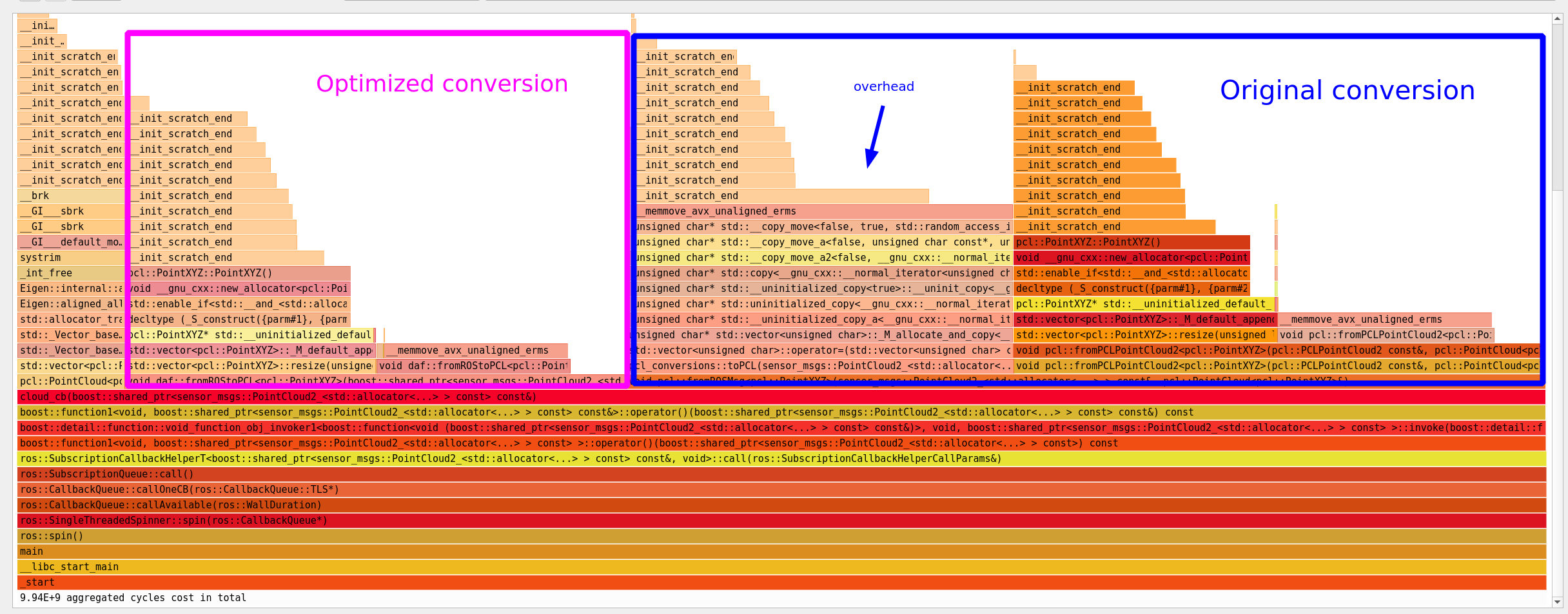Case study: convert ROS message to PCL
Point Cloud Library (PCL) seems to be a cornucopia of opportunities for optimizations.
Even if this is a gratuitous criticism, let's remember what Bjarne Stroustrup said:
"There are only two kinds of languages: the ones people complain about and the ones nobody uses"
So, let's keep in mind that PCL has a huge role in allowing everyone to process pointclouds easily. The developers and maintainers deserve all my respect for that!
Said that, let's jump into my next rant.

Using pcl::fromROSMsg()
If you use PCL in ROS, the following code is your bread and butter:
void cloudCallback(const sensor_msgs::PointCloud2ConstPtr& msg)
{
pcl::PointCloud<pcl::PointXYZ> cloud;
pcl::fromROSMsg(*msg, cloud);
//...
}
Now, I can not count the number of people complaining that this conversion alone uses a lot of CPU!
I look at its implementation and at the results of Hotspot (perf profiling) and a problem becomes immediately apparent:
template<typename T>
void fromROSMsg(const sensor_msgs::msg::PointCloud2 &cloud,
pcl::PointCloud<T> &pcl_cloud)
{
pcl::PCLPointCloud2 pcl_pc2;
pcl_conversions::toPCL(cloud, pcl_pc2);
pcl::fromPCLPointCloud2(pcl_pc2, pcl_cloud);
}
We are transforming/copying the data twice:
- first, we convert from
sensor_msgs::msg::PointCloud2topcl::PCLPointCloud2 - then, from
pcl::PCLPointCloud2topcl::PointCloud<T>.
Digging into the implementation of pcl_conversions::toPCL, I found this:
void toPCL(const sensor_msgs::msg::PointCloud2 &pc2,
pcl::PCLPointCloud2 &pcl_pc2)
{
copyPointCloud2MetaData(pc2, pcl_pc2);
pcl_pc2.data = pc2.data;
}
Copying that raw data from one type to the other is an overhead that can be easily avoided with some refactoring.
This refactoring is not particularly interesting, because I basically "copied and pasted"
the code of pcl::fromPCLPointCloud2 to use a different input type.
Fast-forwarding to the solution, let's have a look at the results:

What is the takeaway of this story?
Measure, measure, measure! Don't assume that the "smart people" implemented the best solution and that you can't actively do anything about it.
In this case, code clarity and reusing existing functions was prefered over performance.
But the impact of this decision is definitively too much to be ignored.